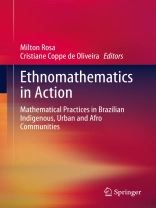This book presents a collection of ethnomathematical studies of diverse mathematical practices in Afro-Brazilian, indigenous, rural and urban communities in Brazil. Ethnomathematics as a research program aims to investigate the interrelationships of local mathematical knowledge sources with broader universal forms of mathematics to understand ideas, procedures, and practices found in distinct cultural groups. Based on this approach, the studies brought together in this volume show how this research program is applied and practiced in a culturally diverse country such as Brazil, where African, indigenous and European cultures have generated different forms of mathematical practice.
These studies present ethnomathematics in action, as a tool to connect the study of mathematics with the students’ real life experiences, foster critical thinking and develop a mathematics curriculum which incorporates contributions from different cultural groups to enrich mathematical knowledge. Bydoing so, this volume shows how ethnomathematics can contribute in practice to the development of a decolonial mathematics education.
Ethnomathematics in Action: Mathematical Practices in Brazilian Indigenous, Urban and Afro Communities will be of interest to educators and educational researchers looking for innovative approaches to develop a more inclusive, democratic, critical, multicultural and multiethnic mathematics education.
Innehållsförteckning
Part I . Introduction.- Chapter 1. An Overview of Diverse Mathematical Practices in Brazil: An Ethnomathematical Perspective in Action.- Part II. Africanities.- Chapter 2. African-based Cultural Practices and Mathematics Practices: Decolonizing Knowledge.- Chapter 3. The Mandira Quilombola Community and the Production of an Anthropophagic Identity.- Chapter 4. African and Afro-Brazilian Roots for Mathematics Teaching: Decolonize the Curriculum.- Part III. Indigenous Diversities.- Chapter 5. Ethnomathematics in the Brazilian Indigenous Contexts.- Chapter 6. Knowledge Networks in the Training of Indigenous Mathematics Teacher.- Chapter 7. Ethnomatthematics Research on Indigenous Peoples’ Knowledge and Practices.- Part IV. Urban Diversities.- Chapter 8. Intertwining the Ethnomathematics and the Deaf Culture to Promote Financial Education for Deaf Students.- Chapter 9. Practices in Ethnomathematics, University, and Basic Education Schools: Possible Interconnetions.-Part V. Diverse Cultural Practices.- Chapter 10. Research in Ethnomathematics in the Context of the Professional Master Degree: An Analysis of Five Theses Developed at UFRN.- Chapter 11. Unity in Differences: Reflections on the Doing of Ethnomodelling and Dialogue through Connecting Ethnomathematics and Modelling.- Chapter 12. An Analysis of the Subjection of (Ethno)mathematical Knowledge in the Study Plan of Brazil’s Landless Workers’ Movement.- Part VI. Conclusions.- Chapter 13. Concluding Remarks about Diverse Mathematical Practices in the Brazilian Context in an Ethnomathematical Perspective: Past, Present, and Future.
Om författaren
Milton Rosa earned a Masters’ degree in 2001 and a Doctorate degree in 2010 both in Education from California State University in Sacramento. He also earned a post-doctorate degree in Education from Universidade de São Paulo in 2015 and his studies focuses on ethnomodelling research, which is the connection between ethnomathematics and mathematical modelling. He has published papers and articles in national and international journals, chapter books, and books in Portuguese, Spanish, and English. He joined conferences and symposia in international and national levels with contributions of plenaries, round tables, communications, and posters. He also has supervised numerous master theses in the area of Mathematics Education. In 2010, Dr. Rosa was awarded the Dr. Carlos J. Vallejo Memorial Award, in the area of Multicultural and Multiethnic Education (MME), in the Special Interest Group (SIG) in the American Education Research Association (AERA) for his contributions in thearea of cultural diversity in Mathematics Education.
Cristiane Coppe de Oliveira graduated in Mathematics from the Universidade Federal de Juiz de Fora (1996), master’s degree in Education from the Universidade Estadual Paulista Júlio de Mesquita Filho (2001) and doctorate from Education from the Universidade de São Paulo (2008). Post-doctorate in Education from the Universidade de Lisboa (2015) and Post-doctorate in Education from the Universidade de São Paulo (2015). Her work investigates the importance of inserting African, Afro-Brazilian and indigenous history and culture into the Mathematics curriculum and the possibilities of breaking with the scientific racism that is established in Eurocentric ideas. She has experience in Education by focusing on mathematics education, history of mathematics, and ethnomathematics.












